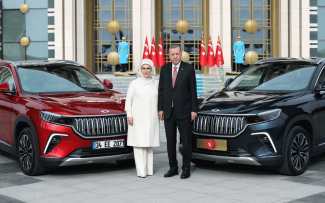Electromobility ‘Made in Türkiye’: Turkey’s automotive sector in the era of change

The global shift towards electromobility is placing pressure on Turkey’s automotive industry (ranked twelfth globally and third in Europe), which remains heavily dependent on the production of internal combustion vehicles for European brands. In response, Turkey is accelerating the development of its own electric vehicles (e.g. Togg) by creating favourable conditions for investment and innovation. This aims to showcase the current government’s achievements and vision for technological advancement, while driving further growth in the domestic automotive sector. However, the Togg project faces challenges such as limited profitability and increasing competition from companies like Tesla and BYD.
Turkey is also becoming an important investment base for the Chinese automotive industry in the field of electromobility. Ankara’s imposition of tariffs on electric vehicles imported from the People’s Republic of China (PRC) in 2024 was intended to attract Chinese investment into Turkey’s automotive sector. The Turkish authorities are aware that the customs union established between Turkey and the EU is of key importance to Beijing, as it allows Chinese electric vehicles to bypass EU tariffs by being manufactured in Turkey. Although Chinese investments create additional competition for Togg, the government in Ankara is primarily counting on the associated benefits, such as job creation, increased profits for the automotive sector, and potentially technology transfer – for instance, in battery and component production.
From pioneers to veterans
Since the 1950s, Turkey has been developing its own automotive sector, which it viewed as key to the country’s industrialisation. To this end, it implemented an import substitution policy, imposing high tariffs on imported vehicles. This was intended to encourage foreign companies to invest in the Turkish automotive sector, thereby creating additional jobs. In the 1970s, cooperation between local actors and global car manufacturers such as Ford, Fiat, and Renault[1] enabled the transfer of technology to Turkey. Meanwhile, the economic reforms introduced by Prime Minister Turgut Özal in the 1980s – which liberalised the economy and promoted foreign sales – together with the customs union agreement concluded between Ankara and the EU in 1995, contributed to a significant increase in exports to Europe from the Turkish automotive sector: from $0.7 billion in 1995, to $1.6 billion in 2004, $22.2 billion in 2014, and $37.2 billion in 2024.
Today, the automotive sector is a pillar of Turkish industry and the country’s technological development, producing around 1 to 1.5 million vehicles annually and generating approximately 5% of GDP. It also accounts for approximately 15% of Turkey’s exports, employs 11% of the industrial workforce (about 0.8 million people, or 2.9% of all workers in Turkey), and contributes around 7% of tax revenues.[2] The production of passenger and commercial vehicles is carried out by the private sector, which currently comprises of 16 companies operating 18 factories (four plants manufacturing passenger cars, seven producing commercial vehicles, and another seven for buses). The largest players include joint ventures with international manufacturers (Anadolu Isuzu, TOFAŞ-Stellantis, Ford Otosan, BMC, Mercedes-Benz Türk, Hyundai Assan, MAN Türkiye, Oyak Renault, and TürkTraktör) as well as companies fully controlled by Turkish capital (Hattat Traktör, Karsan, Otokar, TEMSA, and Togg). In addition, around 1,100 companies operate in the country, producing components and parts for the Turkish automotive sector, with 50–70% of the parts used sourced from local production.[3]
The Turkish government is also involved in the automotive sector, aiming to transform Turkey into an integral part of the global production chain in the industry. A key component of this strategy is the development of research and development (R&D) centres. Currently, around 162 such centres operate in the Turkish market, some of which are joint ventures between Turkish and foreign companies, and which contribute to innovation in the domestic industry. Ankara funds R&D programmes in the automotive sector through the state budget to attract investors and promote the development of advanced technologies in Turkey. One example is the High Technology Incentive Programme (HIT-30), launched in mid-2024, with a budget of $30 billion allocated for investments in the production of electric vehicles ($5 billion), batteries ($4.5 billion), and semiconductors ($5 billion), as well as other initiatives. Ankara hopes that these initiatives will boost the country’s potential for domestic production localisation in the automotive sector, and increase exports to foreign markets.
Towards national electromobility!
The launch of production of the Togg electric car brand also aligns with Turkey’s ambitions to develop its own automotive sector. The company was established in 2018 by a consortium of five private Turkish companies with comprehensive support from the government. The Turkish authorities introduced a range of financial and logistical incentives for the project, including VAT reductions and reimbursements, exemption from customs duties on machinery needed for the production of vehicles and components, favourable loans, state guarantees for the purchase of 30,000 Togg cars, and the free allocation of land for the factory in Gemlik, in the north-west of the country. The total cost of the project is estimated at $3.7 billion. The plan envisages an annual output of 175,000 vehicles. An important part of the initiative was also the creation of a private Turkish-Chinese joint venture called SIRO (with each side holding a 50% stake), which manufactures lithium-ion batteries for Togg vehicles.
Thus far, Togg has produced just over 50,000 units of the T10X SUV – the company’s first and currently only model. The next stage of development envisions expanding the range by 2030 to include more affordable options, such as a sedan (T10F), a hatchback, a compact SUV, and a minivan. The current version of the T10X is priced between $45,000 and $58,000 (depending on the trim level), which significantly exceeds the purchasing power of Turkish citizens and limits sales of the vehicle (at the end of 2024, the average annual disposable income of a household in Turkey was $10,600).[4] Although Togg is intended to be a symbol of national pride and industrial capability, in the current situation of declining purchasing power, the project is proving highly unprofitable. Critics point out that only 72% of the vehicle’s components are produced in Turkey,[5] and that in order to improve the project’s profitability, production would need to increase from the current 30,000 units per year (as in 2024) to at least 200,000. However, achieving this will be difficult without simultaneously launching exports. Additional obstacles include the insufficient charging infrastructure for electric vehicles and the growing competition from global players such as Tesla – the market leader in electric car sales in Turkey,[6] and the more affordable BYD.
The production of the Togg electric car forms part of a state strategy aimed at enhancing the competitiveness of Turkey’s domestic automotive sector in response to the declining innovation and market share of traditional European internal combustion engine (ICE) vehicle manufacturers globally. At present, only petrol and diesel vehicles are produced in Turkey (apart from Togg cars and hybrid models such as those by Toyota),[7] but their sales are gradually declining in favour of electric vehicles. The automotive sector also remains heavily tied to the European market – in 2024, 84.5% of vehicles produced in Turkey were exported to Europe.[8] This means that declining demand for ICE vehicles in Europe will directly reduce their production in Turkey, which in the longer term will adversely impact the country’s automotive industry and its associated revenues (jobs, state income).
To counteract this trend, Ankara is focusing on electric vehicles. Drawing on decades of experience gained through collaboration with European manufacturers, Turkey is striving to develop its own brand and attract foreign electric vehicle producers, for example from the United States and China. As President Recep Tayyip Erdoğan emphasised, Turkey aims to become ‘Europe’s production hub for charging technologies, batteries, and electric vehicles’.[9] He also reiterated the state’s readiness to stimulate the further growth of this industry. However, these ambitions will face challenges, the most significant being the limited export capacity of Togg vehicles given current production volumes, and strong competition from Tesla[10] and Chinese manufacturers, both on the Turkish market and globally.[11]
The government’s stance on Togg
In recent years, Togg has become a central element of President Erdoğan’s political narrative, symbolising national pride, technological sovereignty, and the country’s industrial capabilities. The project has been portrayed as one of the milestones of the ‘Century of Turkey’ (Türkiye Yüzyılı) – a state development programme for the 21st century announced in 2023, aimed at promoting technological and economic progress. Much like the 2024 space mission (Axiom 3), the construction of the new Istanbul airport, or the expansion of the defence industry (e.g. drones), the Togg brand has been presented as proof of Turkey’s technological advancement and potential.
In 2023, Togg featured prominently in President Erdoğan’s election campaign, where it was promoted as one of ‘the nation’s great achievements’[12] in science and technology. It was showcased alongside other technological milestones, such as unmanned aerial vehicles and the launch of the first Turkish astronaut into space. In the face of economic challenges – most notably inflation, which peaked at 85% in November 2022 – Erdoğan used the promotion of the Togg brand to divert public attention from financial hardships and to stir patriotic sentiment. In the pre-election period, the project’s presentation as a symbol of national success was meant to reinforce the electorate’s belief in the long-term validity of the Turkish leader’s policies, portraying recent economic turbulence as merely temporary. The prominent display of the car in polling stations[13] was intended to serve as a visible reminder to voters of who was responsible for these accomplishments. Consequently, Togg has come to be widely perceived in Turkey as a political project.
China increasingly closer to Turkey
China is becoming an important partner for Turkey in the electric vehicle manufacturing sector. Despite significant government support for the creation of the Togg brand, the Turkish electromobility market remains relatively new and faces a range of challenges. Ankara is in need of technology transfer, an increase in production facilities, and, most critically, investment in the development of battery factories for electric vehicles. In this context, Chinese companies in the automotive industry appear to be particularly attractive partners.
An example of potential cooperation between Turkish and Chinese automotive companies is the ongoing negotiation between Togg and the electric vehicle manufacturer Guangzhou Automobile Group (GAC) on establishing a joint venture to produce electric vehicles in Turkey.[14] Togg is likely hoping that this partnership could allow it to reduce production costs and benefit from GAC’s technological expertise. However, it remains unclear what incentives or advantages the Chinese company would receive in return, and whether the talks were successful.
A factor conducive to further deepening Turkish-Chinese cooperation is Ankara’s desire to create jobs domestically and attract capital from the PRC. One example of such collaboration is BYD’s investment in the construction of an electric vehicle factory in Manisa, set to be completed by March 2026, with a value of $1 billion. The plant is expected to produce 150,000 vehicles annually and employ approximately 5,000 individuals. A similar agreement – also worth $1 billion – was signed with the Chinese electric car manufacturer Chery Automobile. It involves investment in an electric vehicle factory (most likely to be located in Samsun), with an annual production capacity of 200,000 vehicles. Chinese companies are reportedly encouraged to invest further due to the fact that Turkey’s labour force remains one of the cheapest in Europe.
Ankara hopes that Chinese component manufacturers will also consider relocating production to Turkey. This applies particularly to batteries, an area in which Chinese companies are global leaders. Establishing component production facilities in Turkey could lead to a further deepening of cooperation between Chinese and Turkish entities. Such collaboration could also facilitate technology transfer, which in the long term could enable Turkey to develop its own manufacturing capabilities in the field of electric vehicle batteries, potentially combining Chinese know-how with local research and development achievements.
An example of such cooperation is the SIRO joint venture, which produces batteries for Togg cars at a factory in Gemlik. Its annual production capacity is 3 GWh, with plans to increase it to 20 GWh by 2031.[15] The establishment of SIRO brings three benefits for the Togg brand. First, relocating battery production to Turkey is intended to reduce the cost of manufacturing battery cells (by eliminating transport costs and potential tariffs), which will help to lower the prices of electric vehicles. Second, local cell production will secure the supply chain for this key component. Third, SIRO will be able to use Turkey’s lithium reserves for battery production for Togg. Currently, the country’s lithium demand for locally produced electric vehicles and electronics stands at around 1,500 tonnes per year, and the 25,000 tonnes of lithium discovered in geothermal resources in southwestern Turkey could meet that demand for approximately 20 years.[16] At the current volume of Togg production, this amount is sufficient, although if Turkey aims to become a global battery producer, it will still have to import the raw material.
Turkey’s game using the customs union and tariffs
Ankara is aware that its customs agreement with the EU increases its investment appeal for Chinese electric vehicle manufacturers. This agreement allows for the tariff-free export of Chinese cars to the EU, provided they are produced in Turkey. The customs union does not require Ankara to indicate the ‘country of origin of components’ used in car manufacturing. Furthermore, the import of Chinese batteries or engines for vehicles by brands such as BYD or Chery, assembled in Turkey, does not affect their classification as ‘originating from Turkey’, as long as the value of imported components does not exceed 40% of the car’s production cost (see Appendix). In other words, it does not matter where Turkish or Chinese manufacturers source their parts for electric vehicle production in Turkey – only what percentage of the final product’s value those components represent. Compliance with these regulations enables manufacturers to circumvent EU tariffs on Chinese-made electric vehicles.
Since the customs union with the EU is a key instrument in negotiations with Chinese manufacturers, Ankara has committed even more decisively to leveraging this advantage. In 2024, the Turkish authorities imposed a 40% tariff on electric vehicles from China and a 50% tariff on gasoline and hybrid cars from that country,[17] in order to promote investment in the domestic automotive sector. At the same time, in July and June 2024, Ankara introduced new regulations, including those stipulated in presidential decrees (laws no. 8639 and 8724), which exempt imports carried out under the Investment Incentive Certificate (Yatırım Teşvik Belgesi – YTB) from additional duties. This document, issued by the Turkish Ministry of Industry and Technology, enables foreign and domestic investors making qualifying investments in strategic sectors (e.g. automotive) to benefit from tax and customs exemptions. These include additional tariffs on vehicles and components, such as those imported from China into Turkey, although it remains unclear whether, in the case of importing finished cars, these permits are limited only to models planned for production within Turkey.[18] To date, only BYD has received this certificate, while Chery is currently undergoing the process of obtaining it.
The imposition of tariffs on Chinese cars imported into Turkey was a calculated and strategic move from Ankara’s perspective. First and foremost, it aimed to halt the mass influx of Chinese electric vehicles, which would have negatively affected sales of the Togg T10X. Secondly, it was intended to pressure Beijing into considering the relocation of car and component production to Turkey. The combination of the ‘carrot and stick’ approach (tariffs and the YTB certificate) proved to be key in attracting Chinese investments. Thirdly, the measure also aimed to reduce Turkey’s trade deficit with China.[19]
In the long term, the entry of Chinese electric vehicle brands into the Turkish market will pose a challenge to the sales of Togg electric cars. The production of Chinese vehicles in Turkey will allow manufacturers to bypass the 40% tariffs imposed by Ankara, thereby increasing their price competitiveness compared to Togg. However, it seems that the Turkish government intends to offset this risk with the opportunities arising from cooperation with Chinese manufacturers. Their presence in Turkey opens up possibilities for Togg to collaborate on expanding its model lineup (e.g. through licensing Chinese designs or working jointly with GAC), advancing electric drive technologies (currently, Togg uses Bosch motors), and potentially developing vehicle software. Expanding this cooperation could lead to a higher share of components being produced domestically in Turkey (such as electric motors), which would enhance Togg’s international price competitiveness.
New rivalry for an electric future
Changes linked to electromobility pose a significant challenge for Turkey. The global automotive industry, moving away from combustion engine vehicles in favour of electric ones, is undergoing a fundamental transformation. These circumstances require Ankara to adapt to new market realities in order to avoid marginalisation, a reduction of its current production capabilities, and a significant decline in the competitiveness of its domestic automotive sector. Investments in the Togg brand and technologies related to its production, such as battery manufacturing, are intended to support this transition and enable Turkey to join the ranks of countries exporting their own electric vehicles and key components. The ultimate aim of these efforts is to bolster the country’s standing in the global automotive market.
However, today Togg is primarily a political project, used to promote a vision of the country’s technological and economic development. At the same time, Turkey aims to make it a financially viable venture and a cornerstone of the future of its automotive industry. Meeting these ambitions appears to be a particularly difficult task, due in part to strong competition in the electric vehicle sector and the still limited production volume.
Ankara views cooperation with Beijing as a way to overcome at least some of the aforementioned obstacles. This collaboration is intended to support the development of the Turkish automotive industry and its integration into global supply chains, including through the transfer of advanced technologies and joint production of key components such as batteries and electric motors. Although Turkey will seek to ensure that Togg remains a project based as much as possible on domestic know-how, it may wish to adopt those Chinese solutions or licences that could enhance the competitiveness of the national brand in both domestic and international markets. Cooperation with the PRC is also expected to attract Chinese capital and increase the local production of components in Turkey. Meanwhile, Ankara sees the customs union with the EU and its own financial incentives (such as the YTB) as tools for achieving these objectives in its relations with Beijing.
Given these conditions, the presence of Chinese car and component manufacturers in Turkey is likely to increase, posing a significant challenge to the functioning of the customs union with the EU. The country’s favourable geographical location, relatively low labour costs, and the legal loopholes that Chinese producers can exploit to circumvent EU tariffs make Turkey a desirable partner. Renegotiating and adapting the customs agreement between Ankara and the EU to current realities – including rules of origin – could offer an opportunity to tighten trade regulations so as to limit the use of Turkey by the PRC as a ‘gateway’ for exporting Chinese electric vehicles to European markets. However, any attempts to impose such conditions on Ankara would almost certainly meet resistance, stemming in part from the high expectations Turks place on cooperation with the Chinese in the field of electromobility and from the significance of this sector for the country’s economic plans.
APPENDIX
The EU–Turkey customs union and the automotive sector
The customs union between the EU and Turkey, established in 1995,[20] allows for the duty-free export of vehicles manufactured in Turkey to EU member states, including those of Chinese brands such as BYD and Chery, provided they meet the origin requirements set out in the Pan-Euro-Mediterranean (PEM) Convention on preferential rules of origin.[21] Turkey has been a signatory to this document since 2012, which enables it to apply harmonised rules of origin in trade with the EU and other countries in the pan-Euro-Mediterranean region within the framework of the existing EU–Turkey customs union.
According to Article 5 (Appendix I, Title II) of the PEM Convention, a vehicle (HS 87) manufactured in Turkey must be sufficiently worked or processed, as defined in Annex II. This annex stipulates that the value of imported components – such as batteries or motors – may not exceed 40% of the final value of the vehicle. Additionally, it is important to note that the Convention does not require the identification of the ‘country of origin of components’, which eliminates the need to trace whether parts come from, for example, China, India, or South Korea. However, Turkish customs authorities are still obliged to verify that the value of imported parts remains within the Annex II threshold (40% of the ex-works price, excluding transport and taxes). Meeting this criterion is essential for the subsequent issuance of an A.TR certificate (a document entitling goods to duty-free export to the EU). Only with this certificate can companies such as BYD and Chery sell their vehicles as ‘originating from Turkey’, thereby bypassing EU tariffs. Title VI (Appendix I) of the PEM Convention on administrative cooperation does allow the EU to conduct audits within the framework of the customs union with Turkey, but it does not authorise the EU to block imports of vehicles produced there as long as the conditions set out in Annex II are fulfilled.
[1] E. Taymaz, K. Yılmaz, Political economy of industrial policy in Turkey: The case of the automotive industry, ESID Working Paper No. 90, September 2017, effective-states.org, p. 36.
[2] OSD – About us, The Automotive Manufacturers Association, OSD, osd.org.tr.
[3] Automotive sector in Turkey, Presidency of the Republic of Türkiye, invest.gov.tr.
[4] ‘Gelir Dağılımı İstatistikleri, 2024’, Türkiye İstatistik Kurumu, 27 December 2024, data.tuik.gov.tr.
[5] ‘Togg surpasses 49K electric vehicles on Turkish roads in 2024’, Türkiye Today, 2 January 2025, turkiyetoday.com.
[6] ‘Tesla Leads Turkey’s EV Market While Experiencing European Slump’, Turkish Minute, 18 March 2025, turkishminute.com.
[7] M. Şenzeybek, P. Mock, Passenger car emissions in Turkey, The International Council on Clean Transportation, April 2019, theicct.org, p. 1.
[8] ‘Turkish Auto Exports Boom in 2024, Europe Dominates with 84.5% Share’, Auto World Journal, 9 December 2024, autoworldjournal.com.
[9] M. Hancock, ‘Turkey’s EV production finally gets into gear’, Arabian Gulf Business Insight, 29 December 2023, agbi.com, after: web.archive.org.
[10] ‘Türkiye becomes bright spot for Tesla as worldwide sales slump’, Daily Sabah, 26 May 2025, dailysabah.com.
[11] ‘Türkiye emerges as Chinese BYD’s fastest-growing market in Europe’, Daily Sabah, 12 May 2025, dailysabah.com.
[12] M. Sancak, ‘How Erdoğan framed his science and tech ‘great achievements’ as part of election campaign’, The Conversation, 26 May 2023, theconversation.com.
[13] ‘Bursa’da oy kullanmaya TOGG’la gelen bakan Varank’a Saadet Partililer tepkili’, T24, 14 May 2023, t24.com.tr.
[14] D. Basaran, ‘Turkish EV maker TOGG in talks with Chinese giant for production’, Türkiye Today, 7 July 2024, turkiyetoday.com.
[15] C. Westerheide, ‘Turkey: Siro kicks off series production of battery modules and packs’, electrive, 21 April 2023, electrive.com.
[16] C. Cariaga, ‘Geothermal can supply Türkiye’s domestic lithium needs for 20 years’, ThinkGeoEnergy, 18 May 2023, thinkgeoenergy.com.
[17] ‘Türkiye raises tariffs on Chinese cars to 50%’, Türkiye Today, 2 January 2025, turkiyetoday.com.
[18] S. Bahadır, ‘Otomotiv sektöründeki yatırıma ithalat teşvikleri’, EY, 22 July 2025, ey.com.
[19] ‘Turkey Imposes Heavy Tariffs on Chinese Electric Vehicles’, Analysis.org, 8 June 2024.
[20] Decision No 1/95 of the EC-Turkey Association Council of 22 December 1995 on implementing the final phase of the Customs Union (96/142/EC), Official Journal of the European Communities, eur-lex.europa.eu.
[21] Council Decision of 26 March 2012 on the conclusion of the Regional Convention on pan-Euro-Mediterranean preferential rules of origin (2013/94/EU), Official Journal of the European Communities, eur-lex.europa.eu.





